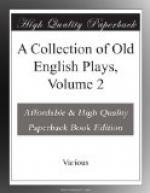The whole scene is singularly fine and impressive; it shows us Fletcher at his highest.
But in other passages we find a second hand at work. In the second scene of the third act there is far less exuberance of language and a different style of versification, as may be seen in the following lines:—
“Orange. My grave Lords, That it hath byn my happines to take in, And with so little blood, so many Townes That were falne off, is a large recompence For all my travell; and I would advise That (since all now sing the sweet tunes of Concord, No Sword unsheathd, the meanes to hurt cut off And all their stings pluckd out that would have usd them Against the publique peace) we should end here And not with labour search for that which will Afflict us when ’tis found. Something I know That I could wish I nere had understood, Which yet if I should speake, as the respect And duty that I owe my Country bids me, It wilbe thought ’tis rather privat spleene Then pious zeale. But that is not the hazard Which I would shun: I rather feare the men We must offend in this, being great, rich, wise, Sided with strong friends, trusted with the guard Of places most important, will bring forth Rather new births of tumult, should they be Calld to their Triall, then appease disorder In their just punishment; and in doing Justice On three or four that are delinquents, loose So many thousand inocents that stand firme And faithfull patriots. Let us leave them therefore To the scourge of their owne consciences: perhaps Th’assurance that they are yet undiscoverd, Because not cyted to their answeare, will So work with them hereafter to doe well That we shall joy we sought no farther in it.”
Here we have vigorous writing, staid and grave and unimpassioned, and a more regular metre. In determining questions of authorship I have so often found myself (and others, too) at fault, that I shrink from adopting the dictatorial tone assumed in these matters by learned Germans and a few English scholars. But I think in the present instance we may speak with tolerable certainty. Before my mind had been made up, my good friend, Mr. Fleay, pronounced strongly in favour of Massinger. He is, I think, right; in fact, it is beyond the shadow of a doubt that Massinger wrote the speech quoted above. In all Massinger’s work there is admirable ease and dignity; if his words are seldom bathed in tears or steeped in fire, yet he never writes beneath his subject. He had a rare command of an excellent work-a-day dramatic style, clear, vigorous, free from conceit and affectation. But he is apt to grow didactic, and tax the reader’s




